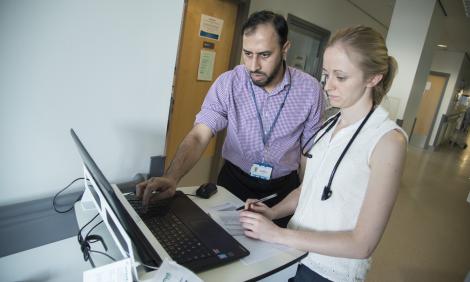Occupational medicine
Doctors in occupational medicine work as specialist clinicians and advisers to both the employer and employee on the relationship between work and health.
They visit workplaces and assess a range of work-related health issues.
Life as an occupational health doctor
You’ll help people stay at work or return to work after accident or illness. You’ll also have a key role in helping to prevent illness and injuries caused by work.
Your work will be very varied, combining your medical practice with influencing and shaping the behaviour of individuals and organisations. You’ll combine your clinical knowledge with a detailed understanding of employment and anti-discrimination legislation, as well as environmental and health and safety law.
You could work in the NHS, other large industrial organisations such as the telecommunications, car manufacturing, energy, emergency repatriation, Armed Forces or transport organisations, or in the private sector. You might work independently or as part of a multi-disciplinary team.
Your typical day will depend on the role and setting, but will often involve a mixture of clinical work with individuals, assessing the workplace and work activities and developing policies regarding the health and safety of employees. You’ll deal with a range of clinical issues such as:
- physical factors which could be anything from infection materials, radiation exposure, respiratory agents, noise-induced hearing loss or work-related back pain to diseases caused by asbestos
- psychological-behavioural issues which could include work-related stress, occupational burnout, depression, neurodiversity factors or post-traumatic stress disorder (PTSD)
Your non-clinical work will include working with a range of professionals to develop policies to ensure the health, safety and wellbeing of employees.
This could include issues like tackling substance misuse in safety critical roles, health and social care professional regulation issues, rehabilitation, redeployment, risk assessment, retirement decisions or the return of staff to the workplace following COVID-19 restrictions.
Occupational medicine is an expanding and exciting field increasingly recognised by UK plc (both public and private sector), other medical specialties, including playing a larger role in future government and public health policy, as the importance of employment to health and wellbeing becomes more widely understood.
Opportunities for teaching, education, training, examining, mentoring and coaching exist both within the NHS and non-NHS organisations. It can also include a people management role, setting strategic direction for organisations, exploring business opportunities and health promotion delivery.
There is the ability to get involved in national and global occupational health issues including the environment, depending on the sector you work in.
How much can I earn?
You’ll first earn a salary when you start your foundation training after medical school. Find out details of current salary ranges for foundation and specialty training, SAS doctors and consultants on the 'Pay for doctors' page.
Remuneration and other benefits can be greater outside of the NHS, especially for accredited specialists. This may include working with global companies.
How about the benefits?
- make a difference
- flexible and part-time working across your career lifespan
- high income early in your career
- work anywhere in the world with transferable skills
- excellent pension scheme
- good holiday entitlement
- NHS discounts in shops and restaurants
Must-have skills
- excellent communication skills to manage a wide range of relationships with colleagues, and patients and their families
- emotional resilience, a calm temperament and the ability to work well under pressure
- teamwork and the capacity to lead multidisciplinary teams
- problem-solving, innovation, creativity and diagnostic skills
- outstanding organisational ability and effective decision-making skills
- first-class time and resource management for the benefit of patients
Entry requirements
Your first step is medical school. Typically, you’ll need excellent GCSEs and three A or A* passes at A level including chemistry for a five-year undergraduate degree in medicine. Many medical schools also ask for biology and others may require maths or physics.
If you already have a degree, you could study for a four-year postgraduate degree in medicine.
You’ll need to pass an interview and admissions test. You’ll be asked to show how you demonstrate the NHS values such as compassion and respect.
Some medical schools look to recruit a mix of students from different backgrounds and geographical areas, so your educational and economic background and family circumstances could be considered as part of your application.
What are my chances of starting a career in occupational medicine?
There are approximately 53 occupational medicine consultants working in the NHS in England. In 2020 there were 35 applications for 12 specialty training places. There is an increasing number of opportunities outside the NHS, allowing you to have a flexible portfolio career.
How to become an occupational medicine doctor
After medical school, you’ll join the paid two-year foundation programme where you’ll work in six placements in different settings.
After your foundation programme, you can apply for paid specialty training to become an occupational medicine doctor, which will take a minimum of six years. Around half of training posts are outside the NHS.
You may be able to train part time, for example for health reasons or if you have family or caring responsibilities.
Where a career in occupational medicine can take you
You could:
- specialise or conduct research in areas such as aviation medicine, radiation medicine, infection control, public health or occupational dermatology
- teach medical students or postgraduate students in training
- get involved in research at universities, the NHS or private sector
-
These organisations have further information about being an occupational medicine doctor, particularly as your career progresses. Take a look.
Faculty of Occupational Medicine
Society of Occupational Medicine
And hear from people working as a doctor in occupational medicine:





